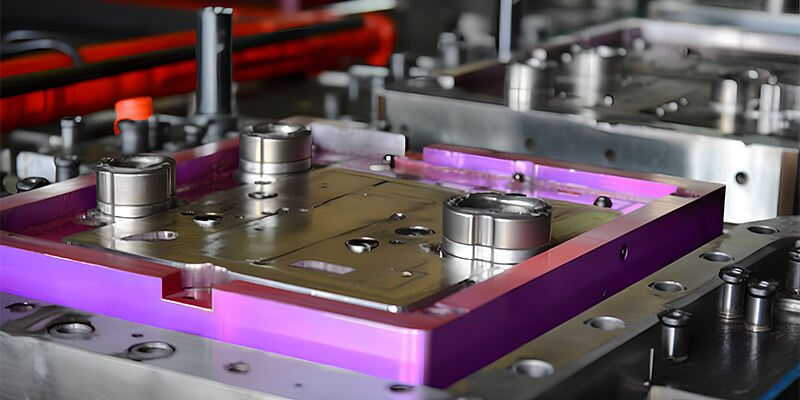अल्यूमिनियम एलोइज़ का टूलिंग और मोल्ड में उपयोग

अल्यूमिनियम एलोइज़ के विशेष गुणों के कारण, जैसे कि हलका वजन, उत्कृष्ट मशीनरी की सुविधा, सब्जी प्रतिरोध और ऊष्मा चालकता, टूलिंग और मोल्ड उद्योग में बहुत उपयोग किया जाता है। ये विशेषताएं विभिन्न प्रकार के टूल्स और मोल्ड्स का उत्पादन करने के लिए अल्यूमिनियम को आदर्श सामग्री बनाती हैं, जिससे कुशलता और प्रदर्शन में वृद्धि होती है। यह लेख टूलिंग और मोल्ड में अल्यूमिनियम एलोइज़ के विविध अनुप्रयोगों और उनके महत्वपूर्ण फायदों का अन्वेषण करता है।
अल्यूमिनियम एलोइज़ का उपयोग इंजेक्शन मोल्ड के उत्पादन में बढ़ते हुए किया जा रहा है। मुख्य फायदे निम्नलिखित हैं:
हलका वजन: अल्यूमिनियम मोल्ड के कम वजन के कारण उनका संभालना आसान होता है और उत्पादन के दौरान तेज़ चक्रकाल होते हैं।
ऊष्मा चालकता: अल्यूमिनियम की उत्कृष्ट ऊष्मा चालकता समान ऊष्मा वितरण सुनिश्चित करती है, जिससे बेहतर ठंडा होने की दर और सुधारित उत्पाद की गुणवत्ता प्राप्त होती है।
डाइ कास्टिंग अनुप्रयोगों में, एल्यूमिनियम एलोइज़ का उपयोग जटिल आकार बनाने वाले मोल्ड्स बनाने के लिए किया जाता है। फायदे इस प्रकार हैं:
जीवनकाल: एल्यूमिनियम मोल्ड्स उच्च दबाव और तापमान सहन कर सकते हैं, जिससे उन्हें उच्च-वॉल्यूम उत्पादन रन के लिए उपयुक्त बनाया जाता है।

लागत-प्रभावी: एल्यूमिनियम मोल्ड्स से संबद्ध निम्न सामग्री की लागत और तेज उत्पादन समय समग्र उत्पादन प्रक्रिया में कुल लागत में बचत का योगदान देती हैं।
एल्यूमिनियम एलोइज़ का उपयोग सामान्यतः CNC मशीनिंग उपकरण बनाने के लिए किया जाता है। फायदे इस प्रकार हैं:
मशीनिंग की सुविधा: एल्यूमिनियम की मशीनिंग क्षमता जटिल उपकरण डिज़ाइन की सटीक निर्माण को आसान बनाती है, जिससे उत्पादन समय कम हो जाता है।
वजन कम करना: हल्के वजन के उपकरण ऑपरेटर की सहजता में सुधार करते हैं और मशीनों पर पहन-पोहन कम करते हैं, समग्र कार्यक्षमता में सुधार करते हैं।
शीट मेटल फॉर्मिंग में, एल्यूमिनियम एलोइज़ का उपयोग टूल्स जैसे डाइज़ और पंच बनाने के लिए किया जाता है। मुख्य पहलू इस प्रकार हैं:
कोरोशन प्रतिरोध: एल्यूमिनियम की कोरोशन प्रतिरोध क्षमता फॉर्मिंग टूल्स की उम्र बढ़ाती है, जिससे रखरखाव की आवश्यकता कम हो जाती है।
डिजाइन में लचीलापन: एल्यूमिनियम को आसानी से आकार दिया जा सकता है और उपयोग किया जा सकता है, जिससे जटिल टूल ज्यामितियों का निर्माण संभव होता है।
एल्यूमिनियम की उच्च पुनः चक्रण क्षमता सustainanble विनिर्माण अभ्यासों के साथ मेल खाती है। पुनः चक्रित एल्यूमिनियम का उपयोग ऊर्जा खपत को कम करता है और पर्यावरणीय प्रभाव को कम करता है, जिससे यह टूलिंग और मॉल्ड अनुप्रयोगों के लिए अधिक पर्यावरण-अनुकूल विकल्प बन जाता है।
टूलिंग और मॉल्ड में एल्यूमिनियम एल्युओइज का उपयोग उनकी बहुमुखिता और विनिर्माण कفاءत को बढ़ावा देने में उनकी क्षमता को दर्शाता है। इंजेक्शन मॉल्ड, डाइ कास्टिंग, CNC मशीनिंग टूल्स और शीट मेटल फॉर्मिंग से लेकर, एल्यूमिनियम एल्युओइज आधुनिक विनिर्माण की मांगों को पूरा करने वाले नवाचारपूर्ण समाधान प्रदान करते हैं। जैसे-जैसे उद्योग विकसित होते हैं, एल्यूमिनियम एल्युओइज का उपयोग टूलिंग और मॉल्ड तकनीक में प्रगति को आगे बढ़ाने में बढ़ती हुई महत्वपूर्ण भूमिका निभाएगा।
टाइपिकल एल्युओइज: 2024(2A12) 5083 6061 6082 7075